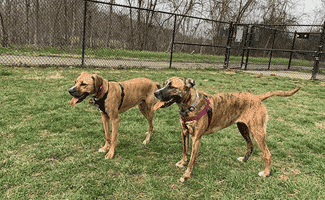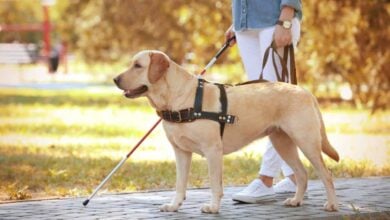When you purchase through links on our site, we may earn a commission. Here’s how it works.
We love our dogs regardless of their breed, but that doesn’t mean we aren’t curious. With the advent of DNA testing for dogs, finding out your pup’s lineage and breed make-up is now a reality. And that’s just the start of everything you can learn about your pup through an at-home DNA test.
Table of Contents
| Winner | Runner-Up | Third Place |
|---|---|---|
 |  | |
| Visit Website | View on Amazon | |
What Is DNA Testing For Dogs?

The concept of DNA testing for dogs might seem foreign, but it’s pretty simple and similar to human DNA testing. Research has advanced a long way with dog DNA as it has with humans. Many scientifically confirmed genetic markers for dogs can help determine breed identification for mixed breeds and possible genetic health risks. It can also uncover certain physical traits, like coat color, tail length, etc.
The companies that sell and perform dog genetic testing maintain a database of breed-related genetic markers. After receiving your dog’s DNA sample, they run it against these profiles. By analyzing breed-specific markers present in your dog’s DNA, companies can give you an idea of the different breeds that make up your dog. They also look for particular genetic mutations known to contribute to certain health conditions.
What Can I Learn From A Dog DNA Test?
Several dog DNA tests can tell you more than ever before, thanks to recent scientific advances. Here are some of the things you can learn from an at-home test and why you should consider getting one for your pup. Dog DNA test kits are a fun way to learn more about your furry friend — and they make a great gift for your dog-loving friends.
1. Mixed-Breed Percentage
As a mixed-breed dog parent, you likely weren’t present at your dog’s conception or birth, so you have no clue what breeds your dog’s parents were. Running a canine DNA test for a mixed-breed dog helps to satisfy that curiosity. Most dog DNA test kits give you a report of your dog’s breed percentage (e.g., 50% Cocker Spaniel, 25% Pug, and so on).
2. Is My Dog Prone To Certain Genetic Conditions?
Recent scientific advances can isolate certain genetic mutations found in a dog’s DNA. These identified genetic markers tell scientists that your dog could be more prone to developing some canine diseases or is a carrier. This information doesn’t mean your dog will develop the disease; it just means that he’s at a higher risk. Knowing that your dog is predisposed to one or several genetic conditions can help you keep a watchful eye on early symptoms.
3. Ancestry
Many companies also give you a detailed description of each breed in your dog’s lineage, so you get a better understanding of each breed’s general physical and personality traits. These tests typically trace your dog’s family tree back three generations to your pup’s great-grandparents.
Relative Finder
You may be able to find your furry friend’s family members too. If your dog’s relatives were tested by a particular company and are in their database, your pup’s DNA test may be able to identify his relatives, possibly locating siblings or parents. Embark and Wisdom Panel are the only companies to offer this family tree matching.
How Does Dog DNA Testing Work?
Not all DNA tests for dogs work the same way, which gives a lot of wiggle room for dog DNA test accuracy. As with most products, some at-home dog DNA kits are much better than others. Read our dog DNA testing reviews to learn more about specific tests we recommend.
Despite the discrepancies, most kits follow the same process that includes a cheek swab (not a dog DNA blood test). Here are the typical steps you take for an at-home DNA test for dogs:
- Purchase an at-home dog DNA kit online.
- Once you receive your kit in the mail, be sure to read all instructions carefully. Most dog DNA test kits ask you to wait a while after your dog’s last meal.
- Swab the inside of your dog’s cheek using the swab(s) contained in the package.
- Pack the saliva-covered swabs in the small container provided in your kit. Use the postage-paid envelope to mail your sample back to the company’s lab.
- You’ll receive email or direct mail results from the lab with your dog’s DNA results.
How Much Does A Dog DNA Test Cost?
The best dog DNA tests for home use will run you anywhere from $79 to $199. Breed identification tests are generally less expensive than health tests. There are a few slightly cheaper varieties of dog DNA tests on the market, but most have poor customer feedback and poor reliability. When it comes to dog DNA tests, you pretty much pay for what you get (the higher the price, the more accurate and detailed the results will be).
How Accurate Are DNA Dog Tests For Breed ID?
It depends on the canine DNA testing company. Some companies have a larger margin of error due to a limited breed profile database. Even with a somewhat limited database, canine DNA testing can still be helpful because the results can narrow down your dog’s breed category (if not the specific breed itself). While the DNA testing center may not have a specific breed on file, they will likely have a similar breed from the same class of dog.
The majority of mixed-breed dogs in developed countries are of well-known breed ancestry. So it’s unlikely that a mixed-breed dog from the United States is going to have the DNA profile of rare breeds like a Tibetan Mastiff or a Lagotto Romagnolo (an Italian retriever). The best DNA dog testing companies include all of the 180 American Kennel Club-recognized breeds.
Dog DNA Test Infographic
Learn more about how dog DNA tests work in this infographic:

Pups Separated At Birth Reunited Thanks To Dog DNA Test

In Spring 2019, Mimi Concannon made a discovery with her dog. Two years prior, she fostered a puppy named Hadley (who she later adopted) from Last Chance Animal Rescue in Waldorf, MD. At the time, Concannon wasn’t aware that Hadley had any siblings. It wasn’t until she did an Embark Dog DNA test on Hadley in early 2019 that she discovered a close genetic match through Embark’s DNA family tree.
With the help of Embark’s user community platform, Conconnan was able to connect with the pet parents of Hadley’s match. She had a sister, Ingrid, who also lived in the Metro DC area! Ingrid’s pet parents had previously done an Embark DNA test, so they were able to make the connection.
The Reunion
They arranged for the siblings (pictured) to reunite at a park in Maryland City, MD, and Hadley’s mom describes their emotional meeting. “It was amazing to see Hadley and Ingrid together — they got along so well and look so alike, which is crazy to see because Hadley has such a unique look.”

As it turns out, Ingrid’s parents also fostered another pup, Iris, who came from the same litter transported from a kill shelter in Mississippi. Concannon is hoping Iris’ forever home comes across this story so the three Foxhound American Bulldog mixes can all be together again one day.
If you’re inspired by Hadley’s story (also featured on WJLA’s Let’s Talk Live) and interested in the possibility of finding your dog’s DNA match, keep reading to learn how it works and see the various at-home kit options. Or if you are ready to order a kit that includes family tree matching for your dog, place your order for Embark today.
Is DNA Testing For Dogs Right For Me?
If you’re looking for some basic information about your dog, like where he could have gotten that up-curved bushy tail, then dog DNA testing may be just the ticket. Also, if you want to know if your dog is more prone to developing certain hereditary health conditions, you have a few options now. Check out our best dog DNA test article for some specific at-home testing recommendations.
Why Trust Canine Journal
Sally has over 20 years of experience in human health sciences communications, including 10 years as an expert on pet health conditions and treatment. She’s also spent over a decade researching and personally using DNA tests as part of an expert team at Canine Journal. As dedicated canine professionals and long-time dog owners, we test and research the best pet products, not only for our own pups but for all of our readers.




